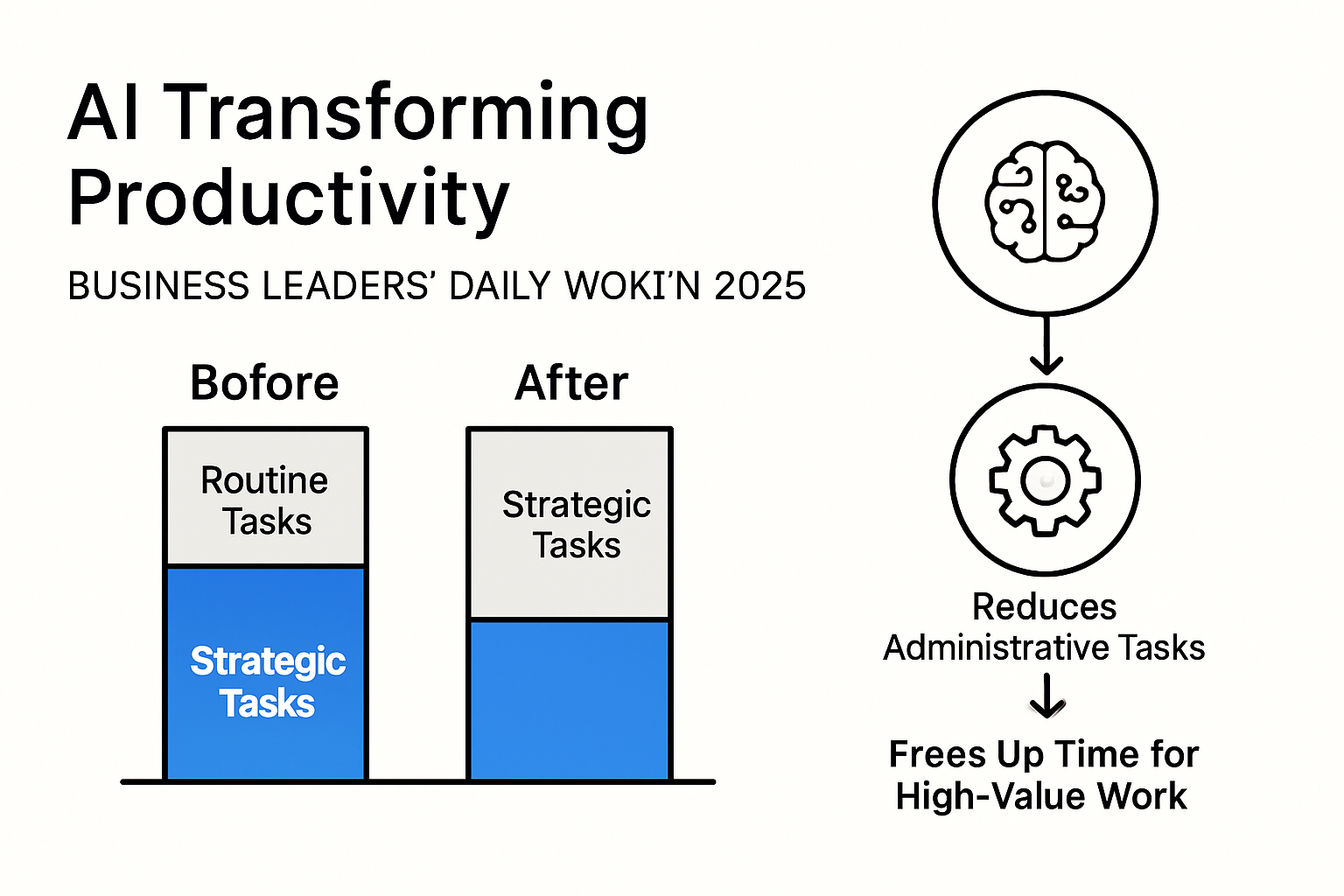AI is taking over business productivity conversations everywhere. In 2025, employees using AI tools are spending up to 25 percent less time on repetitive admin work and getting more done than ever. Most people think this means machines are finally replacing humans, but the real story is even bigger. AI is actually unlocking new creative and strategic roles no one saw coming. The smartest teams are using AI not to do less work but to do the right work faster, smarter, and with surprising impact.
Table of Contents
- How AI Is Transforming Productivity In 2025
- Key AI Tools For Business Teams And Leaders
- AI Benefits For Different Roles And Industries
- Challenges And Best Practices For Adopting AI
Quick Summary
| Takeaway | Explanation |
|---|---|
| AI enhances workplace productivity significantly. | By 2025, AI tools can reduce administrative tasks by up to 25%, allowing workers to focus on more strategic activities. |
| Personalized AI recommendations boost efficiency. | AI analyzes work patterns to provide tailored strategies, optimizing workflow and performance for individual users. |
| Train and prepare teams for AI integration. | Organizations must assess their readiness and invest in upskilling employees to ensure successful AI implementation. |
| Ethics and transparency are vital in AI use. | Companies should develop governance frameworks that address privacy, bias, and ethical concerns related to AI processes. |
| Phased AI pilot programs ensure smooth adoption. | Implementing AI through controlled pilots allows organizations to fine-tune systems and gather feedback for continuous improvement. |
How AI Is Transforming Productivity in 2025
The integration of artificial intelligence into business operations is rapidly reshaping how organizations approach productivity and efficiency. By 2025, AI is no longer a futuristic concept but a critical strategic tool for business leaders seeking competitive advantage.
AI Redefining Workplace Performance
Artificial intelligence is fundamentally restructuring how work gets accomplished. Research from a comprehensive field study involving 6,000 workers revealed that generative AI tools integrated into daily applications can reduce administrative tasks by up to 25%. This dramatic reduction in time spent on routine activities allows professionals to focus on high-value strategic work.
The transformation goes beyond simple task automation. Strategic research on AI integration in executive leadership suggests organizations are now creating specialized roles like Chief AI Officers to manage sophisticated AI implementation strategies. These roles are critical in ensuring AI technologies are not just implemented but strategically aligned with business objectives.

Personalized Productivity Enhancement

One of the most significant developments is AI’s ability to create personalized productivity experiences. By analyzing individual work patterns, neural networks, and performance data, AI systems can now provide tailored recommendations for workflow optimization. The groundbreaking study on ‘Enhancing Workplace Productivity and Well-being Using AI Agent’ demonstrates how machine learning techniques can generate autonomous task management strategies specific to each worker’s cognitive and performance profile.
This personalization extends to predicting potential bottlenecks, suggesting optimal work intervals, and even recommending breaks to maintain peak cognitive performance. The AI does not replace human decision-making but acts as an intelligent assistant that understands individual work rhythms and challenges.
Ethical and Strategic AI Implementation
As AI becomes more integrated into productivity frameworks, business leaders must approach its implementation with careful consideration. The most successful organizations will be those that view AI not as a replacement for human talent but as a powerful augmentation tool. This means investing in training, establishing clear ethical guidelines, and creating transparent systems that maintain human oversight.
The future of productivity is collaborative - where AI provides insights, automates repetitive tasks, and allows human professionals to engage in more creative, strategic, and meaningful work. By 2025, the most competitive businesses will be those that have successfully integrated AI as a core component of their operational strategy, creating more agile, responsive, and intelligent work environments.
The role of AI in productivity is no longer about incremental improvements but about fundamental transformation of how work is conceptualized, executed, and optimized.
Key AI Tools for Business Teams and Leaders
In the rapidly evolving digital workspace, AI tools have become essential companions for business teams and leaders seeking to maximize productivity and strategic capabilities. The right AI technologies can transform complex workflows, enabling more intelligent and efficient work processes.
Intelligent Collaboration and Communication Tools
Research from Coursera highlights the transformative potential of AI tools in workplace collaboration. Microsoft Copilot stands out as a powerful integration tool that embeds AI capabilities directly into familiar Microsoft applications, allowing seamless workflow enhancement. Otter.ai represents another breakthrough, providing advanced meeting transcription and summarization capabilities that eliminate manual note-taking and ensure comprehensive documentation.
These tools go beyond simple automation. They create intelligent environments where team communication becomes more precise, transparent, and actionable. By capturing nuanced details and generating concise summaries, AI collaboration tools help teams maintain clarity and focus, reducing miscommunication and administrative overhead.
Process Management and Workflow Optimization
The groundbreaking research on ProcessGPT demonstrates how generative AI can revolutionize business process management. By utilizing advanced GPT models, organizations can automatically generate process models, identify optimization opportunities, and support complex decision-making scenarios. This approach transforms traditional workflow management from a reactive to a predictive and proactive discipline.
Notable AI tools in this domain include Notion AI, which offers intelligent knowledge management capabilities, and advanced project management platforms that use machine learning to predict potential bottlenecks, recommend resource allocations, and streamline team coordination. These tools enable leaders to make data-driven decisions with unprecedented speed and accuracy.
Content Generation and Professional Development
IBM’s insights reveal the expanding role of AI in content creation and professional skill enhancement. Tools like Grammarly provide sophisticated writing assistance, offering real-time grammar, style, and tone recommendations. ChatGPT and similar generative AI platforms can draft reports, generate creative content, and provide instant research support, dramatically reducing time spent on routine writing tasks.
Moreover, these AI tools are not just productivity enhancers but also learning platforms. They can provide personalized recommendations for skill development, suggest learning resources based on individual performance patterns, and help professionals continuously upgrade their capabilities.
The future of business leadership is intrinsically linked with AI tool proficiency. Leaders who strategically integrate these technologies will create more adaptive, intelligent, and efficient organizations. The key is not to view AI as a replacement for human skills, but as a powerful amplification tool that extends human potential and creativity.
Below is a summary table highlighting the key AI tools described, their primary function, and main benefits for business productivity:
| AI Tool | Primary Function | Main Benefit |
|---|---|---|
| Microsoft Copilot | AI integration in Microsoft suite | Seamless workflow enhancement |
| Otter.ai | Meeting transcription & summarization | Eliminates manual note-taking, ensures accurate documentation |
| Notion AI | Knowledge/process management | Intelligent knowledge sharing & task optimization |
| Grammarly | Writing assistance | Real-time grammar, style & clarity improvement |
| ChatGPT | Content creation, Q&A, research | Fast report generation & instant insights |
AI Benefits for Different Roles and Industries
Artificial intelligence is revolutionizing productivity across diverse professional landscapes, offering tailored solutions that transform how different roles and industries approach work challenges. The impact of AI extends far beyond generic automation, providing specialized capabilities that enhance performance and strategic decision-making.
Performance Enhancement in Customer-Facing Roles
Research on generative AI in workplace settings reveals remarkable improvements in customer support performance. Customer service agents using AI assistance resolved customer issues 15% faster, with less experienced team members showing significant gains in both speed and quality of output. This demonstrates AI’s potential to rapidly upskill professionals and standardize service quality.
In sales and marketing, AI tools enable more personalized customer interactions by analyzing vast datasets to predict customer preferences, recommend tailored solutions, and optimize engagement strategies. The technology transforms traditional reactive approaches into proactive, data-driven customer relationship management.
Industry-Specific Productivity Transformations
According to PwC’s 2025 Global AI Jobs Barometer, industries most exposed to AI technologies experienced a dramatic productivity growth of 27% between 2018 and 2024. Financial services and software publishing emerged as frontrunners, demonstrating how strategic AI integration can create substantial competitive advantages.
Different industries are leveraging AI uniquely:
- Healthcare: AI assists in diagnostic imaging, patient risk assessment, and personalized treatment planning
- Manufacturing: Predictive maintenance, quality control, and supply chain optimization
- Finance: Fraud detection, algorithmic trading, and personalized financial advice
- Education: Adaptive learning platforms, personalized curriculum development
Below is a table summarizing how different industries are leveraging AI for productivity gains, as described above:
| Industry | Main Use of AI | Example Benefits |
|---|---|---|
| Healthcare | Diagnostic imaging, patient assessment | Improved diagnosis & tailored treatments |
| Manufacturing | Predictive maintenance, quality control | Reduced downtime, higher efficiency |
| Finance | Fraud detection, trading, financial advice | Faster decisions, greater accuracy |
| Education | Adaptive learning, custom curriculums | Personalized education, better outcomes |
Strategic Workforce Development
Research from the Brookings Institution indicates that AI adoption is closely linked with firm growth, increased employment, and heightened innovation. Companies investing in AI are increasingly seeking more educated and technically skilled employees, signaling a transformative shift in workforce requirements.
This trend suggests that AI is not about replacing human workers but creating more complex, strategic roles that require advanced cognitive skills. Professionals who embrace AI as a collaborative tool will find themselves better positioned to tackle increasingly sophisticated workplace challenges.
The future of work is not about humans versus AI, but humans empowered by AI. Each industry and role will experience unique benefits, with the most successful organizations viewing AI as a strategic partner in achieving unprecedented levels of efficiency, creativity, and performance.
Challenges and Best Practices for Adopting AI
Adopting artificial intelligence is not a straightforward process. While AI promises transformative potential, organizations face complex challenges that require strategic, nuanced approaches to successful implementation.
Understanding Organizational Readiness
Research from the Federal Reserve reveals significant variation in AI adoption rates across organizations, ranging from 5% to 40%. This disparity highlights that successful AI integration depends on more than technological capability - it requires comprehensive organizational preparedness.
Key factors in organizational readiness include:
- Technical infrastructure: Robust data management systems
- Workforce skills: Training and upskilling existing talent
- Cultural openness: Encouraging innovation and technological adaptation
- Strategic alignment: Ensuring AI initiatives match broader business objectives
Leaders must conduct thorough assessments of their current technological ecosystem, identifying potential integration points and potential resistance areas before launching AI initiatives.
Navigating Ethical and Privacy Considerations
According to the EDUCAUSE 2024 survey, significant concerns persist around AI implementation, particularly regarding privacy, ethical use, and potential bias. Organizations must develop robust governance frameworks that address these critical issues.
Best practices for ethical AI adoption include:
- Transparent algorithms: Ensuring AI decision-making processes can be explained
- Bias mitigation: Regular audits of AI systems to identify and correct potential discriminatory patterns
- Privacy protection: Implementing stringent data handling protocols
- Interdisciplinary oversight: Creating committees with diverse expertise to guide AI strategy
Strategic Implementation and Continuous Learning
Successful AI adoption is not a one-time event but an ongoing journey of adaptation and learning. Organizations should approach AI implementation through incremental, carefully monitored pilots that allow for continuous refinement.
Recommended implementation strategies include:
- Phased rollout: Start with low-risk, high-impact projects
- Continuous training: Regular upskilling programs for employees
- Feedback mechanisms: Creating channels for ongoing system improvement
- Cross-functional collaboration: Ensuring AI initiatives involve perspectives from multiple departments
The most successful organizations will view AI not as a technology to be implemented, but as a strategic capability to be cultivated. This requires a holistic approach that balances technological innovation with human expertise, ethical considerations, and organizational culture.
Ultimately, AI adoption is about creating intelligent, adaptive systems that augment human capabilities rather than replace them. Leaders who understand this fundamental principle will be best positioned to harness AI’s transformative potential.
Frequently Asked Questions
How is AI transforming productivity for business leaders in 2025?
AI is significantly enhancing productivity by reducing repetitive administrative tasks by up to 25%, allowing employees to focus on more strategic activities, leading to higher workplace performance.
What are some key AI tools for improving business productivity?
Key AI tools include Microsoft Copilot for workflow enhancement, Otter.ai for advanced meeting transcription, Notion AI for intelligent knowledge management, Grammarly for writing assistance, and ChatGPT for content creation.
How can organizations ethically implement AI?
Organizations should establish clear governance frameworks that address ethical considerations, ensure transparency in AI decision-making, mitigate bias, and protect user privacy during AI implementation.
What are the benefits of AI for customer-facing roles?
AI enhances performance in customer-facing roles by enabling faster issue resolution, personalizing customer interactions, and improving service quality through data-driven insights.
Reclaim Your Time With AI-Driven Productivity
Many business leaders struggle to keep up as administrative work and scattered processes slow down their teams. As explored in “The Role of AI in Productivity for Modern Business Leaders 2025,” the true transformation comes when organizations use AI not just to automate, but to rethink how work is organized and delivered. If your team is overwhelmed with manual tracking, duplicate efforts, and endless meetings, it is time to experience a smarter, more efficient way to work.

Let Gammatica.com help you make the leap from theory to action. Our AI-powered platform removes up to 16 hours of admin each week through automated task management, collaboration tools, CRM integration, and smart workflow suggestions. Take the first step to unlock higher performance and creativity in your business. Discover how our AI suggestions, Kanban boards, and checklist automations give your team time back. Visit Gammatica.com and start building your productive, AI-enhanced workplace today.



